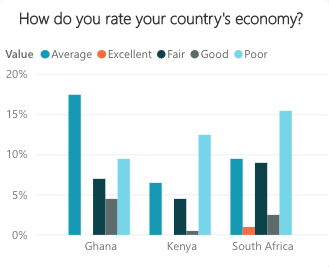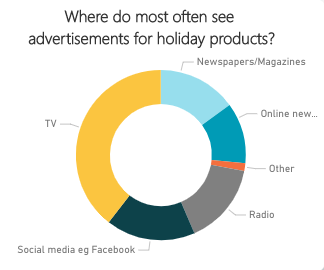As many countries in sub-Saharan Africa struggle with slow economies, high rates of unemployment, and rising taxes, there are concerns around how these factors will affect the media and advertising industries. In the past few months, there have been layoffs at prominent media houses including MultiChoice in South Africa and MediaMax in Kenya, who have both cut staff citing loss of revenue streams. The holiday season and associated spending usually provide a boost to economies, but uncertainty could lead consumers to spend less and advertisers to hold back on aggressive marketing plans.
In order to examine how consumers are planning for 2019’s holiday season, GeoPoll conducted our annual holiday season survey in Kenya, Ghana, and South Africa. The survey was administered by SMS in October 2019. Findings demonstrate how consumers are planning for the holidays, what they feel about their country’s economy and their own personal finances, and whether they see advertisements as an important factor in making holiday purchasing decisions.
See a dashboard of key results below and further analysis below. Contact us if you’re interested in purchasing the full dataset.
Perceptions of the Economy in Ghana, Kenya, and South Africa
 Results around personal financial stability and perceptions towards each country’s economy show the disparity between different segments of the population; While levels of personal financial stability are relatively split between moderately stable, somewhat stable, and not stable at all, overall respondents rate their economies as either average or poor, with just 12% in Ghana, 4% in Kenya, and 14% in South Africa rating their country’s economy as either good or excellent.
Results around personal financial stability and perceptions towards each country’s economy show the disparity between different segments of the population; While levels of personal financial stability are relatively split between moderately stable, somewhat stable, and not stable at all, overall respondents rate their economies as either average or poor, with just 12% in Ghana, 4% in Kenya, and 14% in South Africa rating their country’s economy as either good or excellent.
In Kenya and South Africa, a higher percentage reported being not stable financially compared to 2018; In Kenya, 35% reported being not stable, compared to 31% in 2018, and in South Africa 27% reported being not stable financially in 2019, versus 21% who said the same in 2018. In Ghana, however, the percent who are not stable financially decreased from 24% in 2018 to 19% in 2019.
Despite the fact that respondents were unlikely to report being very stable financially, most respondents still predict that their holiday spending will increase this year compared to last year. In Ghana and Kenya, 43% and 42% respectively reported that their holiday spending will increase, in line with the percentage who reported the same in 2018. Only in South Africa do more respondents believe their holiday spending will decrease than increase; 33% expect their spending to increase, while 39% expect it to decrease.
When we examined why holiday spending may decrease this year, we found making less money and having less savings to be the most-cited reasons across countries, although in Ghana and South Africa respondents were more likely to have less savings, while in Kenya a higher percentage of respondents (47%) report making less money than those who have less savings (39%). For those who expect their holiday spending to increase this year, the most common reason was items being more expensive in Ghana and Kenya, while in South Africa the largest portion of those who expect their spending to increase cited having more savings to spend on the holidays.
In terms of where they expect to get money for holiday spending, the largest group of respondents in each country, 36% overall, plan to use savings, while working more jobs (30%) and reducing other spending (26%) were the second and third most common options.
Africa Holiday Shopping Predictions for 2019
 Despite reports of online shopping growing throughout sub-Saharan Africa, including around holiday events such as Black Friday, our study finds that most holiday shopping is still done offline. Overall just 12% report that they will do most of their shopping online, with the highest online shopping numbers being in Ghana, where 14% report that they will shop mostly online, and the lowest in South Africa. While certain purchases may be made online, we find that local markets are the most popular place for holiday shopping in Kenya and Ghana, at 57% each, while in South Africa responses are more split between supermarkets (39%), local markets (27%), and chain retail store (27%).
Despite reports of online shopping growing throughout sub-Saharan Africa, including around holiday events such as Black Friday, our study finds that most holiday shopping is still done offline. Overall just 12% report that they will do most of their shopping online, with the highest online shopping numbers being in Ghana, where 14% report that they will shop mostly online, and the lowest in South Africa. While certain purchases may be made online, we find that local markets are the most popular place for holiday shopping in Kenya and Ghana, at 57% each, while in South Africa responses are more split between supermarkets (39%), local markets (27%), and chain retail store (27%).
We also examined the factors that contribute to making holiday purchase decisions, finding that although financial stability is moderate to low, product quality remains a priority over product price. Overall 41% list price as an attribute that is important to them when shopping for others over the holidays, while 52% list quality as an important attribute. Brand name is a less important factor, with only 9% listing this as a consideration when shopping.
While gift purchases are often a focus of retailers around the holidays, GeoPoll’s study finds that the majority of money spent around the holidays goes towards food and drink for entertaining, rather than gifts for others or themselves, general socializing, or travel expenses. Overall 42% report spending the most on supplies for entertaining, with this number being highest in South Africa, at 48%. Ghanaians are the most likely to spend the majority of their money on gifts for traveling, while South Africans also are more likely to spend on travel.
The Impact of Advertisements on Holiday Spending

Advertising spend increases globally around the holidays, and digital media in particular been growing as an important source for retailers looking to reach their target audiences with news of sales and product announcements. Digital ad spend has been increasing not only in the US, where $6 billion was spent over the period from Black Friday to Cyber Monday, but also in Africa and the Middle East, where expenditures on social media and other digital advertising channels are increasing.
To find out the impact of all these advertisements on consumers, we asked respondents how often they pay attention to product advertisements when looking for holiday gifts, finding that most respondents, 37% ‘sometimes’ pay attention to advertisements. Overall 22% report that they always pay attention to advertisements for holiday spending, with the highest proportion of those respondents coming from South Africa and the lowest from Ghana, while 17% say they often pay attention. A combined total of 24% say they never or rarely pay attention to advertisements, demonstrating that more people are paying some attention to advertisements than those who do not take them into account at all while shopping.
Illustrating the growing importance of digital media, we find that social media is a strong second behind TV as the biggest source of advertisements for holiday products: While 35% say they most often see holiday ads on TV, 29% report that social media platforms are the biggest source of holiday advertisements and 9% report that they most often see ads on online news sites. Radio, traditionally one of the widest-reaching mediums for advertisements in Africa, was listed by only 12% as the medium where they most often see holiday advertisements.
Gather Data on Holiday Plans with GeoPoll
Using GeoPoll’s database of respondents throughout emerging markets and mobile survey platform, you can conduct custom research on how consumers plan to shop and entertain this holiday season. In addition, GeoPoll Audience Measurement provides advertisers with the most up to date data available on the best timeslots to reach your target audience. If you’re interested in conducting your own research with GeoPoll, please contact us today.



